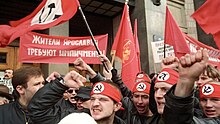National Bolshevik Party
| “ | Russia is everything, the rest is nothing! | „ |
| ~ The National Bolshevik Party's motto. |
The National Bolshevik Party was a Russian political party founded in 1993 and was dissolved in 2007.
History[edit]
Early years[edit]

The party was founded by Eduard Limonov and Aleksandr Dugin on the 1st May 1993, after Limonov was inspired by the works of Dugin. Afterwards, the NBP joined the National Salvation Front, which brought together communists and nationalists in the opposition against Boris Yeltsin. However, the NBP was forced to quit due to disagreements with Vladimir Žirinovskij and even within the NBP itself, which caused the farewell of one of its founders and main ideologue Aleksandr Dugin who blamed Eduard Limonov of depraving National Bolshevism and selling himself and the party to the enemies of Russia like the USA.
Mass apostasy[edit]
In the last years of the party, a substantial slice of national-Bolshevik militants, noticed a change in the political-ideological line of the NBP have decided to abandon it.
Foundation of a new party[edit]
In August 2006, the dissidents, led by Aleksej Golubovič, created the National Bolshevik Front, allied with the Evrazijskij Soyuz Molodëži, the new youth group created by Aleksandr Dugin, decidedly anti-Atlantic and supporter of the president Putin.
Judicial problems[edit]
On the other hand, the original branch of the NBP was running into serious judicial troubles and since 2005 has been fighting in the courtrooms to modify a banning decree. From 2006 until 2007, Limonov and his followers allied themselves with the neoliberals Garri Kasparov and Mikhail Kas'janov in the Drugaja Rossija cartel.

Banning[edit]
On the 7th August 2007, the NBP was officialy banned. This would ultimately cause various riots made by militants of the party for manifesting against the banning.
Ideology[edit]
Theoretical bases[edit]
The National Bolshevik Party was an openly anti-Atlanticist, anti-Western, Eurasianist and nationalist party. It supported Stalinism and Soviet communism together with the Third Position.
Inspirations[edit]
The party took inspiration from various philosophers including Julius Evola, Ernst Niekisch, Georges Sorel, Hegel, Bakunin and Yukio Mishima.
Ideological changes[edit]
Although this, the party, thanks to Eduard Limonov, decided to side with the neoliberals, softened the anti-Western sentiment and positively evaluated the "Ukrainian Orange Revolution".
Membership[edit]
Founders[edit]
- Eduard Limonov: leader and founder of the party, he was a writer and poet, author of auto-biographical novels that have been successful in France, Russia and other countries. He was also a soldier and participant in the Yugoslav civil war alongside the Serbs.
- Aleksandr Dugin (formerly): co-founder of the party, philosopher and political scientist famous for his strongly anti-Western and neo-fascist ideas.
Members[edit]
- Zakhar Prilepin: Russian writer and leader of the political party "For Truth" from 1st February 2020.
- Vladimir Linderman: Latvian and Russian publicist, political dissident of Jewish origin.
- Beness Aijo: Latvian National Bolshevik activist of Russian and Ugandan descent.
- Sergei Aksenov: Russian political dissident, publicist, former prisoner, cofounder of coalition The Other Russia and one of the leaders of the political party The Other Russia.
- Aleksandr Averin: Russian journalist, political dissident and publicist.
- Andrei Dmitriev: Russian journalist, political dissident, publicist, co-founder of coalition The Other Russia and one of leaders of the eponymous political party The Other Russia.
- Sergei Fomchenkov: Russian politician, ex-commander of the United Armed Forces of Novorossiya and member The Other Russia.
- Taisiya Osipova: Russian opposition activist from the "The Other Russia" party.
- Maxim Gromov: Russian political dissident, human rights activist, former political prisoner, publicist and one of the leaders of the political party The Other Russia and Prisoner's Union.
- Aleksandr Nepomniachtchi: Russian poet, singer and bard. He died at the age of 39 in Ivanovo.
- Natalya Medvedeva: Russian poet, writer, singer, and frontwoman of the hard rock bands Tribunal Natalii Medvedevoy and NATO. She killed herself with an overdose of heroin in 2003.
- Aleksandr Dolmatov: Russian opposition activist. Dolmatov committed suicide in a Dutch detention centre.
- Yuriy Chervochkin: Russian opposition activist. He was murdered at the age of 22.
- Andrei Sukhorada: former leader of the Primorsky Partisans. He killed himself on the 11th June 2010.
- Sergey Kuryokhin: Russian composer, pianist, music director, experimental artist, film actor and writer, based in St. Petersburg, Russia. He died on the 9th July 1996 at the age of 42.
- Yegor Letov: Russian poet, musician, singer-songwriter, audio engineer and conceptual artist, best known as the founder and leader of the post-punk/psychedelic rock band Grazhdanskaya Oborona. He died of heart failure in his sleep on the 19th February 2008 at his home in Omsk, at the age of 43.
Gallery[edit]
Images[edit]
-
Double-headed eagle, symbol of the National Bolshevik Party.
-
NPB members in 2006.
-
NBP members manifesting in 1999 after Boris Yeltsin's impeachment.
-
NBP members demonstrating.
-
NBP members demonstrating in Yaroslavl on the 7th November 2004.
Videos[edit]
Trivia[edit]
- "The Revolution that wasn't" is a 2008 documentary film that talks about the story of the Party.
- There are other smaller groups that go under the same name of the party, promimently in Latvia, Moldova, Sweden and Ukraine.
- The flag of the NBP is an union between the swastika (flag of the Nazi Party) and a drawing of a hammer and sickle (iconic symbol of Communism).
- European Villains
- Russia
- Modern Villains
- Neutral Evil
- Vocal Villains
- Political
- Political Parties
- Dissolved Organizations
- Propagandist
- Vandals
- Mongers
- Destroyer
- Extremists
- Jingoists
- Fascist
- Communist
- Supremacists
- Xenophobes
- Anti-Semitic
- Barbarians
- Vengeful
- Obsessed
- Extravagant
- Charismatic
- Artistic
- Delusional
- Evil vs. Evil
- Grey Zone



